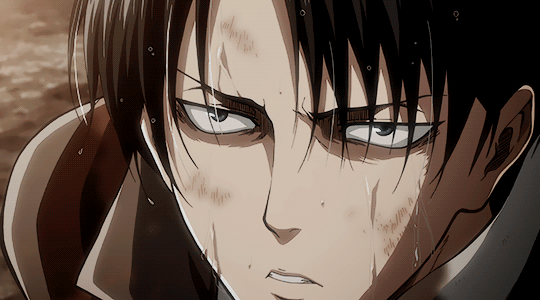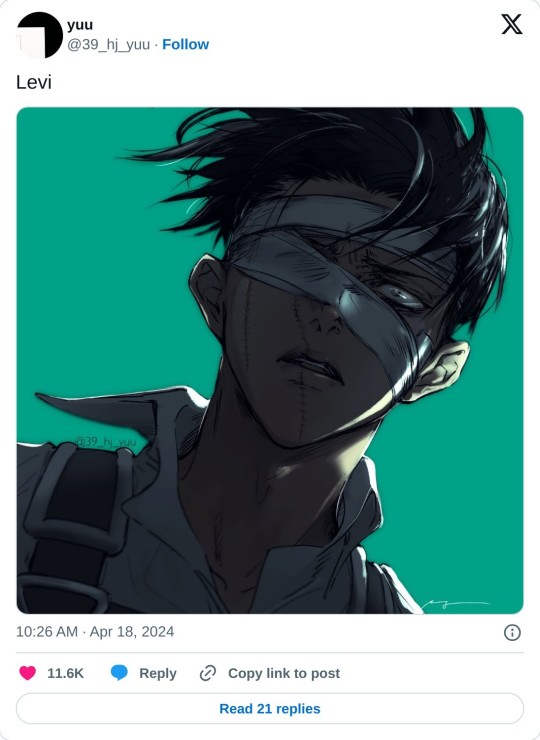Text

704 notes
·
View notes
Text
Thank you so much for this contribution! I think you really capture Eren’s tragedy as a character, in that even though he was a bad person and could have chosen differently, he ultimately succumbed to his nature and wished so badly that he hadn’t been born as the awful person he was. Eren was a slave to his own nature.
In fact, Eren reminds me of Kenny, in that Kenny was also a bad and violent person, but despite that, Kenny’s dream was to see the world as Uri saw it; he wanted to experience what compassion was like. In essence, Kenny wished his nature was different. Both Eren and Kenny had enough self-awareness to recognize they were bad people, but for the most part, they were unable to overcome who they were born as.
Attack on Titan and Eren Yeager: Free Will, Determinism, and Compatibilism—A Question of Choice and Moral Responsibility
Compatibilism can be simply defined as the assertion that free will can be compatible with determinism—that is, they are not mutually exclusive and both can be true at once. It is a way to reconcile the problem of moral responsibility within typical deterministic arguments. Arthur Schopenhauer, a German philosopher, once said: "Man can do what he wills but he cannot will what he wills." Essentially, in a classical compatibilist argument, a person is free to act according to a particular motive, but the nature of that motive is determined. Attack on Titan represents the concept of choice under the framework of compatibilism.
Applying this framework to Eren—Eren could not help the way he was born; however, he was capable of exacting agency in his choices. He was born as someone with a monstrous will (as Levi described him as), someone desiring freedom at all costs; however, he was capable of weighing alternative choices and acting against that desire. He was also capable of understanding the moral rightness and consequences of both his desires and his choices, and he was also the ultimate source of his actions. Thus, Eren holds moral responsibility for those actions.
Levi Commenting on Eren's Nature During the "Female Titan" Arc:

Eren Telling Reiner He Thinks They Were Born as Who They Are:

Eren Telling Zeke He is Who He is Because He Was Born into the World:
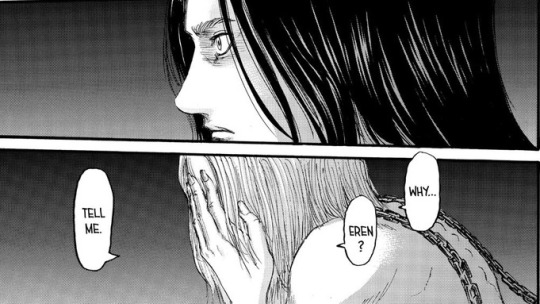

In causal determinism, "everything that occurs is the inevitable result of the laws of nature and the state of the world in the distant past" (X). Essentially, every one of our actions in the present has a cause rooted in the past, detached from our own actions. It implies that we cannot do anything other than what we ultimately end up doing and that we are not the causal source of our own actions, since all our actions are rooted in factors beyond our control. As such, if none of us have the freedom to do otherwise, it begs the question: are any of us responsible for our actions, even those of great evil?
However, classical compatibilists hold that the truth of causal determinism does not preclude one from having the freedom to do otherwise. Compabilists believe that causal determinism has no impact on our moral responsibility. In classical compatibilism, free will is typically defined as the ability to select among alternative courses of action. The choices themselves and the context of the situation may be determined, but choice can still be carried out within that context. Classical compatibilism, in this sense, can be visualized via a common "fork in the road" image:

Our presence at that fork in the road was determined and guaranteed, but we have the ability to choose which path to go on. Given the possibility of alternative choices, more than one future is possible if classical compatibilism holds true.
The common Classical Incompatibilist argument of determinism is as follows (X):
If someone acts of her own free will, then she could have done otherwise. (A – C)
If determinism is true, no one can do otherwise than one actually does. (D – E)
Therefore, if determinism is true, no one acts of her own free will (F).
As such, according to the argument, if determinism is true, no one has access to alternatives. Given that, only one future is possible in this argument of determinism. Attack on Titan seemingly supports this incompatibilist argument of determinism on the surface due to the fact that Eren only ever sees one future.
Eren Saying the Future Does Not Change:

Eren did indeed have access to multiple alternatives, however. Eren only ever sees one future in Attack on Titan because his alternative choices are rooted in the past and in his manipulation of it:
Eren purposely diverts Dina's titan from Bertolt to eat his own mother instead. The alternative choice would have been to let Bertolt be eaten.
Eren purposely convinces and forces Grisha to kill the Reiss family and take the Founder, even after Grisha had lost his nerve in doing so. The alternative choice would have been to let the Reiss family live.
If no alternative choices were available, Eren would not have had the capability of manipulating the past in the first place.
But, for the sake of argument, let us say that Eren did not have alternative choices. If he did not have alternative choices available, would that then be an argument that he had no free will? Another common compatibilist definition of free will is the ability of an agent to act according to their wishes, free of impediments. Take this explanation:
"On this view, freedom involves two components, a positive and a negative one. The positive component (doing what one wills, desires, or inclines to do) consists in nothing more than what is involved in the power of agency. The negative component (finding “no stop”) consists in acting unencumbered or unimpeded. Typically, the classical compatibilists’ benchmark of impeded or encumbered action is compelled action. Compelled action arises when one is forced by some external source to act contrary to one’s will."
Eren never acted contrary to his will in Attack on Titan. He wanted to do the Rumbling, and he did it.
Eren Saying He Wanted to do the Rumbling:

No one was able to convince or compel him to do otherwise. In Paths, he is originally shackled, but his will overrides the shackles placed upon him:

Later, when the Alliance is traveling to stop Eren, they attempt to converse with him in Paths to convince him to go against his own wishes, but Eren persists; he "keeps moving forward" against all obstacles to his desires. He refuses to negotiate with the Alliance, telling them that he refuses to engage in a discussion and that the only way to stop him will be by ending his life:
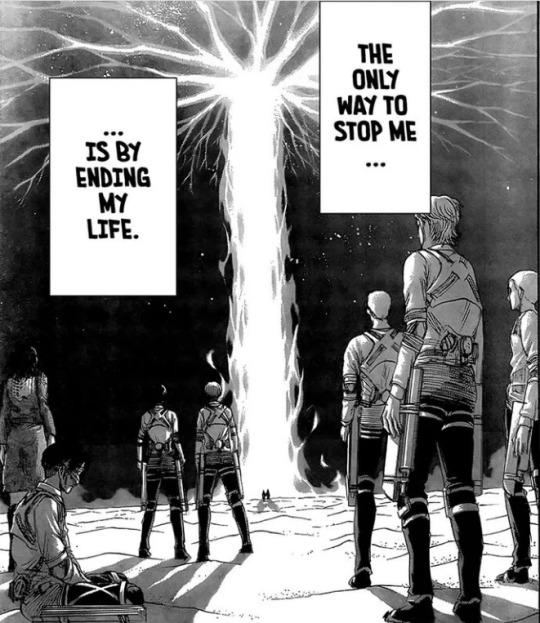
In response to these compatibilistic arguments, the Incompatibilist Consequence Argument posits that, in order for one to have freedom, one must be the ultimate source of their choices. The classic argument for this is as follows (X):
No one has power over the facts of the past and the laws of nature.
No one has power over the fact that the facts of the past and the laws of nature entail every fact of the future (i.e., determinism is true).
Therefore, no one has power over the facts of the future.
Consider defining "ultimate source" by the following explanation (X):
"An agent is an ultimate source of her action only if, at the very least, something necessary for her action originates within the agent herself. It cannot be located in places and times prior to the agent’s freely willing her action. If an agent is not the ultimate source of her actions, then her actions do not originate in her, and if her actions are the outcomes of conditions guaranteeing them, how can she be said to control them? The conditions sufficient for their occurrence were already in place long before she even existed!"
Attack on Titan specifically rejects this view of determinism, as Eren has the power to alter events in his own past to influence the future. He is the ultimate source of his own actions.
See @p-ssypink's response in this post:
Once Eren got to Paths in the final arc of Attack on Titan, he willfully manipulated the information his past self had access to in order to guarantee a certain outcome. He was the determinator of his own future.
Furthermore, consider these words from Hajime Isayama, the mangaka for Attack on Titan:
Excerpts from Hajime Isayama's Blog in 2016, discussing Minoru Furuya's manga, Himeanole (X, X):
Excerpt 1: "The serial-killer Morita's desire in life is nothing but to strangle people to death. Why is he a psychopathic killer? The manga portrays it as simply his nature. In other words, that's just the way he was born.
It's completely different from the usual concept of, "he's actually a kind boy, but was bullied to the point of killing and that made him realize how much he enjoyed it". It's true that he was bullied and that was a contributing factor. But even before he was bullied, he clearly said there was something 'not normal' about him."
Excerpt 2: "At first, he considered dying, because he felt he needed to erase the scum from the face of the earth. But before he died, there was one thing he wanted to do no matter what. It wasn't basketball or soccer or travelling to space. It was to receive sexual pleasure from strangling people to death. As many times as he could.
By coincidence, I am not a murderer. I think anyone who tries to understand others, even if you're not a murderer yourself, can still empathize to a degree.
'It's not like I chose to be born this way.'
It's about our nature from the moment we're born."
Excerpt from Isayama Hajime’s Bessatsu Shonen August 2017 Interview, discussing Attack on Titan's ending and Himeanole's influence on it (X):
Ultimately, I don't think the series passes judgment on what is "right" or "wrong." For example, when I read Furuya Minoru's "Himeanole," I knew society would consider the serial killer in the story unforgivable under social norms. But when I took into account his life and background I still wondered, "If this was his nature, then who is to blame...?" I even thought, "Is it merely coincidence that I wasn't born as a murderer?" We justify what we absolutely cannot accomplish as "a flaw due to lack of effort," and there is bitterness within that. On the other hand, for a perpetrator, having the mindset of "It's not because I lack effort that I became like this" is a form of solace. We cannot deny that under such circumstances, the victims' feelings are very important. But considering the root of the issue, rather than evaluating "what is right"...to be influenced by various other works and their philosophies, and to truthfully illustrate my exact feelings during those moments - I think that's what Shingeki no Kyojin's ending will resemble.
The above excerpts (and Eren's own words, as displayed earlier in this post) demonstrate that Eren could not control what he desired; he was born a monster. As such, free will is not entirely supported by the narrative of Attack on Titan. However, as has been demonstrated, neither is determinism. Compatibilism hence remains the best framework for interpreting Eren's character and his moral responsibility in Attack on Titan.
Eren was not a good person—he knew he was a bad person and that his actions in carrying out the Rumbling were wrong.
Eren Demonstrating His Knowledge That the Rumbling Would Be the "Greatest Act of Violence in History":
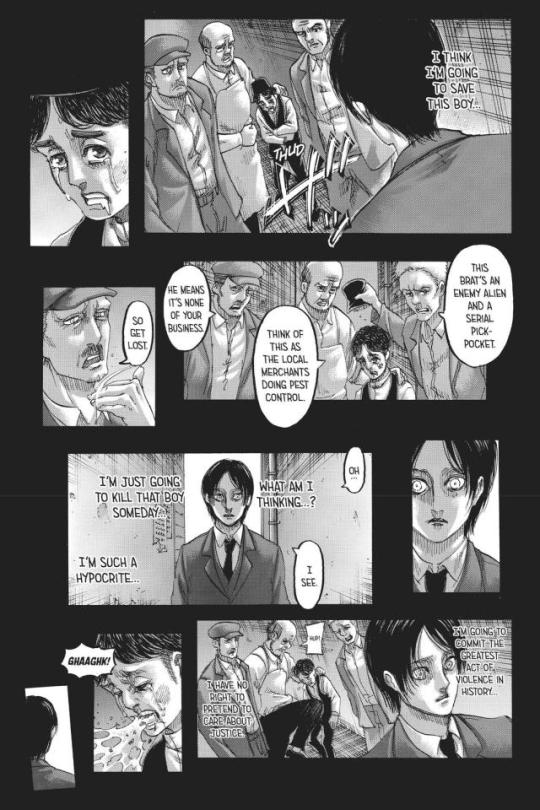
Eren Displaying His Guilt by Apologizing to Ramzi Because He Knew His Future Actions Were Wrong:
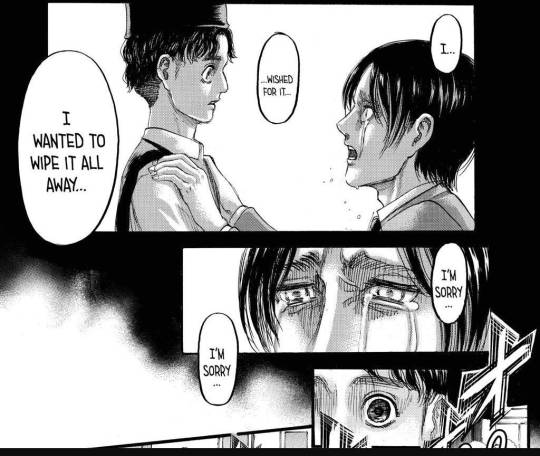
Although Eren could not control what he desired, he was responsible for the consequences that were generated, as he always had the capability of choosing otherwise and he was the ultimate source of all his actions. As such, his actions cannot be justified in any way to alleviate him of responsibility.
Note: This post was inspired by @cosmicjoke's last response in this chain and was created to elaborate on the points brought up in that response:
18 notes
·
View notes
Text

34 notes
·
View notes
Text
To elaborate on the point about compatibilism in Attack on Titan, I wrote this post:
It's cute how I keep seeing people claiming Eren did it all for his loved ones, because he "just wanted to keep them safe and give them long, happy lives", meanwhile, this little fucker literally murdered his own mother to ensure events would play out exactly as he needed for him to end up with the power to enact the Rumbling and wipe out 80% of humanity. He does it all knowing Sasha is going to die, knowing Hange is going to die, knowing Levi ends up disabled, knowing he's going to get countless other Survey Corps soldiers killed, knowing he steals away everyone's agency by forcing them into a conflict they were actively trying to avoid, directly placing them in harms way and forcing them into immeasurably traumatizing actions and experiences. But, yeah, he did it for his loved ones.
People really don't use their brains when talking about this story.
Eren literally admits the real reason he did it to Armin and Ramzi both, that he wanted to, that he had to, not for anyone else, but for himself. The very fact he throws his arms wide while crushing innumerable people underfoot, smiling, and saying "Freedom" is all the proof you need that he didn't do what he did for anyone but himself, and yet people still try to make this claim that he did. It's really unreal.
70 notes
·
View notes
Text
Attack on Titan and Eren Yeager: Free Will, Determinism, and Compatibilism—A Question of Choice and Moral Responsibility
Compatibilism can be simply defined as the assertion that free will can be compatible with determinism—that is, they are not mutually exclusive and both can be true at once. It is a way to reconcile the problem of moral responsibility within typical deterministic arguments. Arthur Schopenhauer, a German philosopher, once said: "Man can do what he wills but he cannot will what he wills." Essentially, in a classical compatibilist argument, a person is free to act according to a particular motive, but the nature of that motive is determined. Attack on Titan represents the concept of choice under the framework of compatibilism.
Applying this framework to Eren—Eren could not help the way he was born; however, he was capable of exacting agency in his choices. He was born as someone with a monstrous will (as Levi described him as), someone desiring freedom at all costs; however, he was capable of weighing alternative choices and acting against that desire. He was also capable of understanding the moral rightness and consequences of both his desires and his choices, and he was also the ultimate source of his actions. Thus, Eren holds moral responsibility for those actions.
Levi Commenting on Eren's Nature During the "Female Titan" Arc:

Eren Telling Reiner He Thinks They Were Born as Who They Are:

Eren Telling Zeke He is Who He is Because He Was Born into the World:


In causal determinism, "everything that occurs is the inevitable result of the laws of nature and the state of the world in the distant past" (X). Essentially, every one of our actions in the present has a cause rooted in the past, detached from our own actions. It implies that we cannot do anything other than what we ultimately end up doing and that we are not the causal source of our own actions, since all our actions are rooted in factors beyond our control. As such, if none of us have the freedom to do otherwise, it begs the question: are any of us responsible for our actions, even those of great evil?
However, classical compatibilists hold that the truth of causal determinism does not preclude one from having the freedom to do otherwise. Compabilists believe that causal determinism has no impact on our moral responsibility. In classical compatibilism, free will is typically defined as the ability to select among alternative courses of action. The choices themselves and the context of the situation may be determined, but choice can still be carried out within that context. Classical compatibilism, in this sense, can be visualized via a common "fork in the road" image:

Our presence at that fork in the road was determined and guaranteed, but we have the ability to choose which path to go on. Given the possibility of alternative choices, more than one future is possible if classical compatibilism holds true.
The common Classical Incompatibilist argument of determinism is as follows (X):
If someone acts of her own free will, then she could have done otherwise. (A – C)
If determinism is true, no one can do otherwise than one actually does. (D – E)
Therefore, if determinism is true, no one acts of her own free will (F).
As such, according to the argument, if determinism is true, no one has access to alternatives. Given that, only one future is possible in this argument of determinism. Attack on Titan seemingly supports this incompatibilist argument of determinism on the surface due to the fact that Eren only ever sees one future.
Eren Saying the Future Does Not Change:

Eren did indeed have access to multiple alternatives, however. Eren only ever sees one future in Attack on Titan because his alternative choices are rooted in the past and in his manipulation of it:
Eren purposely diverts Dina's titan from Bertolt to eat his own mother instead. The alternative choice would have been to let Bertolt be eaten.
Eren purposely convinces and forces Grisha to kill the Reiss family and take the Founder, even after Grisha had lost his nerve in doing so. The alternative choice would have been to let the Reiss family live.
If no alternative choices were available, Eren would not have had the capability of manipulating the past in the first place.
But, for the sake of argument, let us say that Eren did not have alternative choices. If he did not have alternative choices available, would that then be an argument that he had no free will? Another common compatibilist definition of free will is the ability of an agent to act according to their wishes, free of impediments. Take this explanation:
"On this view, freedom involves two components, a positive and a negative one. The positive component (doing what one wills, desires, or inclines to do) consists in nothing more than what is involved in the power of agency. The negative component (finding “no stop”) consists in acting unencumbered or unimpeded. Typically, the classical compatibilists’ benchmark of impeded or encumbered action is compelled action. Compelled action arises when one is forced by some external source to act contrary to one’s will."
Eren never acted contrary to his will in Attack on Titan. He wanted to do the Rumbling, and he did it.
Eren Saying He Wanted to do the Rumbling:

No one was able to convince or compel him to do otherwise. In Paths, he is originally shackled, but his will overrides the shackles placed upon him:

Later, when the Alliance is traveling to stop Eren, they attempt to converse with him in Paths to convince him to go against his own wishes, but Eren persists; he "keeps moving forward" against all obstacles to his desires. He refuses to negotiate with the Alliance, telling them that he refuses to engage in a discussion and that the only way to stop him will be by ending his life:

In response to these compatibilistic arguments, the Incompatibilist Consequence Argument posits that, in order for one to have freedom, one must be the ultimate source of their choices. The classic argument for this is as follows (X):
No one has power over the facts of the past and the laws of nature.
No one has power over the fact that the facts of the past and the laws of nature entail every fact of the future (i.e., determinism is true).
Therefore, no one has power over the facts of the future.
Consider defining "ultimate source" by the following explanation (X):
"An agent is an ultimate source of her action only if, at the very least, something necessary for her action originates within the agent herself. It cannot be located in places and times prior to the agent’s freely willing her action. If an agent is not the ultimate source of her actions, then her actions do not originate in her, and if her actions are the outcomes of conditions guaranteeing them, how can she be said to control them? The conditions sufficient for their occurrence were already in place long before she even existed!"
Attack on Titan specifically rejects this view of determinism, as Eren has the power to alter events in his own past to influence the future. He is the ultimate source of his own actions.
See @p-ssypink's response in this post:
Once Eren got to Paths in the final arc of Attack on Titan, he willfully manipulated the information his past self had access to in order to guarantee a certain outcome. He was the determinator of his own future.
Furthermore, consider these words from Hajime Isayama, the mangaka for Attack on Titan:
Excerpts from Hajime Isayama's Blog in 2016, discussing Minoru Furuya's manga, Himeanole (X, X):
Excerpt 1: "The serial-killer Morita's desire in life is nothing but to strangle people to death. Why is he a psychopathic killer? The manga portrays it as simply his nature. In other words, that's just the way he was born.
It's completely different from the usual concept of, "he's actually a kind boy, but was bullied to the point of killing and that made him realize how much he enjoyed it". It's true that he was bullied and that was a contributing factor. But even before he was bullied, he clearly said there was something 'not normal' about him."
Excerpt 2: "At first, he considered dying, because he felt he needed to erase the scum from the face of the earth. But before he died, there was one thing he wanted to do no matter what. It wasn't basketball or soccer or travelling to space. It was to receive sexual pleasure from strangling people to death. As many times as he could.
By coincidence, I am not a murderer. I think anyone who tries to understand others, even if you're not a murderer yourself, can still empathize to a degree.
'It's not like I chose to be born this way.'
It's about our nature from the moment we're born."
Excerpt from Isayama Hajime’s Bessatsu Shonen August 2017 Interview, discussing Attack on Titan's ending and Himeanole's influence on it (X):
Ultimately, I don't think the series passes judgment on what is "right" or "wrong." For example, when I read Furuya Minoru's "Himeanole," I knew society would consider the serial killer in the story unforgivable under social norms. But when I took into account his life and background I still wondered, "If this was his nature, then who is to blame...?" I even thought, "Is it merely coincidence that I wasn't born as a murderer?" We justify what we absolutely cannot accomplish as "a flaw due to lack of effort," and there is bitterness within that. On the other hand, for a perpetrator, having the mindset of "It's not because I lack effort that I became like this" is a form of solace. We cannot deny that under such circumstances, the victims' feelings are very important. But considering the root of the issue, rather than evaluating "what is right"...to be influenced by various other works and their philosophies, and to truthfully illustrate my exact feelings during those moments - I think that's what Shingeki no Kyojin's ending will resemble.
The above excerpts (and Eren's own words, as displayed earlier in this post) demonstrate that Eren could not control what he desired; he was born a monster. As such, free will is not entirely supported by the narrative of Attack on Titan. However, as has been demonstrated, neither is determinism. Compatibilism hence remains the best framework for interpreting Eren's character and his moral responsibility in Attack on Titan.
Eren was not a good person—he knew he was a bad person and that his actions in carrying out the Rumbling were wrong.
Eren Demonstrating His Knowledge That the Rumbling Would Be the "Greatest Act of Violence in History":

Eren Displaying His Guilt by Apologizing to Ramzi Because He Knew His Future Actions Were Wrong:

Although Eren could not control what he desired, he was responsible for the consequences that were generated, as he always had the capability of choosing otherwise and he was the ultimate source of all his actions. As such, his actions cannot be justified in any way to alleviate him of responsibility.
Note: This post was inspired by @cosmicjoke's last response in this chain and was created to elaborate on the points brought up in that response:
#attack on titan#shingeki no kyojin#shingeki no kyoujin fanart#eren yeager#attack on titan meta#aot meta#shingeki no kyojin meta#aot.meta#meta.eren#c: eren yeager#my thoughts
18 notes
·
View notes
Photo

Art by YUJI
※ Posted with written permission
※ Do not repost or remove the source
2K notes
·
View notes
Text

Tried making a little animation the quality got fucked up
73 notes
·
View notes
Text


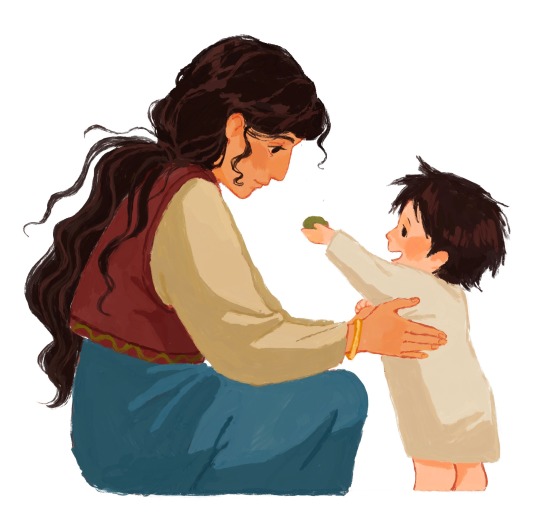


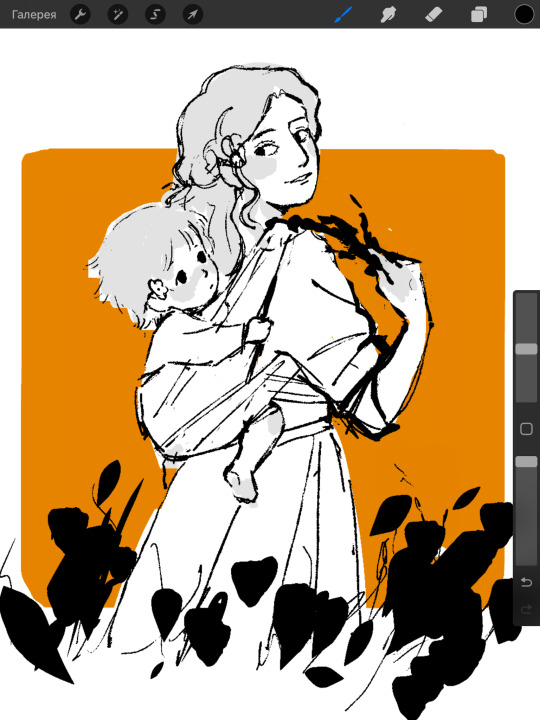


Little Hange and her parents 🥺
668 notes
·
View notes
Photo

animated an old pic w matte painting
2K notes
·
View notes
Text
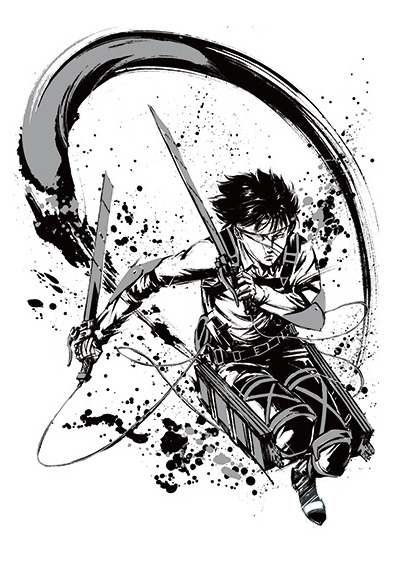

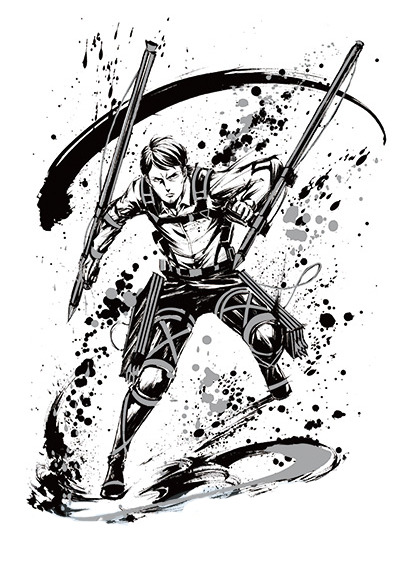

Attack on Titan
#aot.art#art.levi#art.eren#art.jean#art.sasha#c: levi ackerman#c: eren yeager#c: sasha braus#c: jean kirstein#q
291 notes
·
View notes
Note
What do you think about Levi not mentioning Farlan and Isabel throughout the anime? They were literally his first real friends and family. Even in their deaths he was frustrated. But strangely we don't see any flashback scenes about them or Levi talking about them. It's obviously disturbing to me.
I have an Oc an underground childhood friend that I ship with Levi in particular and I didn't write their story down, but it makes me think that if my character was in danger or if she died with Farlan and Isabel or if she ended up dying long after their deaths, Levi would never remember her or talk about her, just like Farlan and Isabel's deaths, and that bothers me.
I know it's a bit strange to get this kind of analysis-like question since you are a Levi writer's blog. But since I love your writings and I really liked and found comfort in your answer to anon's question about whether Levi likes weak people. Because I am also a person who gets caught up in rumors and doubts whether Levi will like us or not haha.
Anyway, I don't want to deviate too much from the subject and make it too weird. You can answer question if you want.
Hi, sweetie! Oh, I see. Yes, I understand where you're coming from. First of all, I'd like to thank you for saying that you love my writing, and I'm so happy you found comfort in my answer about Levi and a "weak person." It's alright that we get lost in what the fandom discusses too frequently; it has happened to me too. And do not worry, rest assured, I don't find these "analysis questions" weird at all. Though my analysis will never be as good as my close friends', like my friend Sushi who used to have a meta-analysis blog of SnK or Cosmic! They are beyond amazing.
But to answer your question, before I get lost in my thoughts, long story short, Isayama is extremely bad at writing emotional connections in my humble opinion. In my personal group chat with my SnK close friends, we discuss this in great detail at least twice per week haha. In my opinion, Isayama is a writer or a storyteller who struggles to find a balance between keeping the plot going and creating a cohesive society and interrelationships between characters. I personally think that the story was always advancing so fast, full gas, no stop, that we hardly got any real details about the characters that made them human beyond their mere roles in the story.
I always use as an example, if one chapter in the manga or anime started with different panels of the veterans getting ready and sitting down all together for a meeting, we could have seen how their personal chambers were, how their interactions were not only between them aside the presence of the cadets, but we could have also seen how they confront early mornings, if they had paintings of loved ones, flowers on their desks, etc. It would have taken ... 5-10 pages at most, and we could have learned so much. It's something I even keep in mind while planning my own stories; I have an entire notebook of "backstory" for all the characters of Holy Ground, canon or not. So when the time comes around, I can drop little details of their lives here and there because... Let's be honest, has someone ever sat down next to you and said "here, let me tell you my whole life"? No, usually, you get to know someone organically, and that's also what, in my opinion, should happen in stories.
Now, going back to why Levi doesn't talk about Farlan and Isabel. Well, my best answer to you is, sadly, another question. Tell me one scene in the whole anime or manga where Levi was having some quality time with someone he felt comfortable enough to open up and talk about fond memories, be vulnerable, or even crack a joke about some silly hormonal stuff he did as a young man with Farlan. Tell me, I will wait... Haha.
Levi doesn't talk about Farlan or Isabel because he doesn't have screen time to talk about almost anything besides the plot moving haha. I would put my hands on a burning fire and swear that Farlan and Isabel are still extremely important to Levi! And so would be your OC! Don't let Isayama's literary limitations fence your story. That's my best advice; explore feelings that he didn't have the production time for (perhaps he wasn't allowed to write about it because of financial stuff) or he simply wasn't good at it.
Hope that helps!
Love ya!
30 notes
·
View notes
Note
We know that Levi forgave Erwin in every way after learning of his confession and intentions, but didn't he feel bad when he found out that the soldiers who died for the future of humanity were actually dying for a personal dream? Or I find it disturbing that he didn't say anything to Erwin about it and didn't scold him, because he is someone who hates meaningless and empty deaths. There are so many unexplained contradictory things to Aot…
But see, I don't think those soldiers died for a personal dream, because up until that point, Erwin's plans and the sacrifices needed to make those plans successful, indeed, advanced the cause for humanity's freedom and victory. It was only near the very end of Erwin's life that he began to make decisions that went against what was in humanity's best interests, i.e. the coup attempt, and then Erwin refusing to stay behind for the mission to retake Wall Maria, neither of which lead to any soldiers direct deaths, except of course Erwin's own. Like Levi says to Erwin, "It's because of you we've gotten this far". He genuinely means that, and that's also why he's able to forgive Erwin. Also because Erwin, ultimately, gives up on his dream for humanity, and in that moment, becomes the great leader Levi always believed him to be. Yes, he needed Levi to make the choice for him, but he still accepted that choice and followed through on it, charging the Beast Titan with the hundred other soldiers. It would have been pointless to scold Erwin at that point, or hold him accountable for having a personal dream that was fueling him, because Erwin already hated himself enough for it. He already felt guilty enough. What would Levi screaming at him and guilt tripping him more have accomplished?
Something people don't seem to understand about Levi is that he's an incredibly nonjudgmental person. I think people tend to project their own judgmental attitudes onto him, and then get upset when he doesn't act in the ways they themselves would have acted in any, given situation. We see the same thing with people who get mad at Levi for not going after Annie or trying to kill Annie for what she did to his squad. But like I said, Levi is someone who, if he genuinely believes a person is remorseful or sorry for a wrong they've committed, will forgive that person. Hell, I think he would have been ready to forgive Zeke if Zeke had actually shown genuine remorse for the things he'd done.
15 notes
·
View notes
Photo

Levi
2K notes
·
View notes
Text

Kuchel and her little boy
34 notes
·
View notes
Text
Levi’s humor is underrated. I love how sarcastic he is.

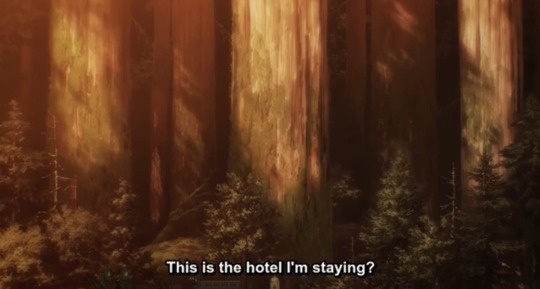


I love his salty ass
#aot.screenshots#screenshots.levi#screenshots.zeke#aot.text#text.levi#c: levi ackerman#c: zeke yeager#my thoughts
316 notes
·
View notes
